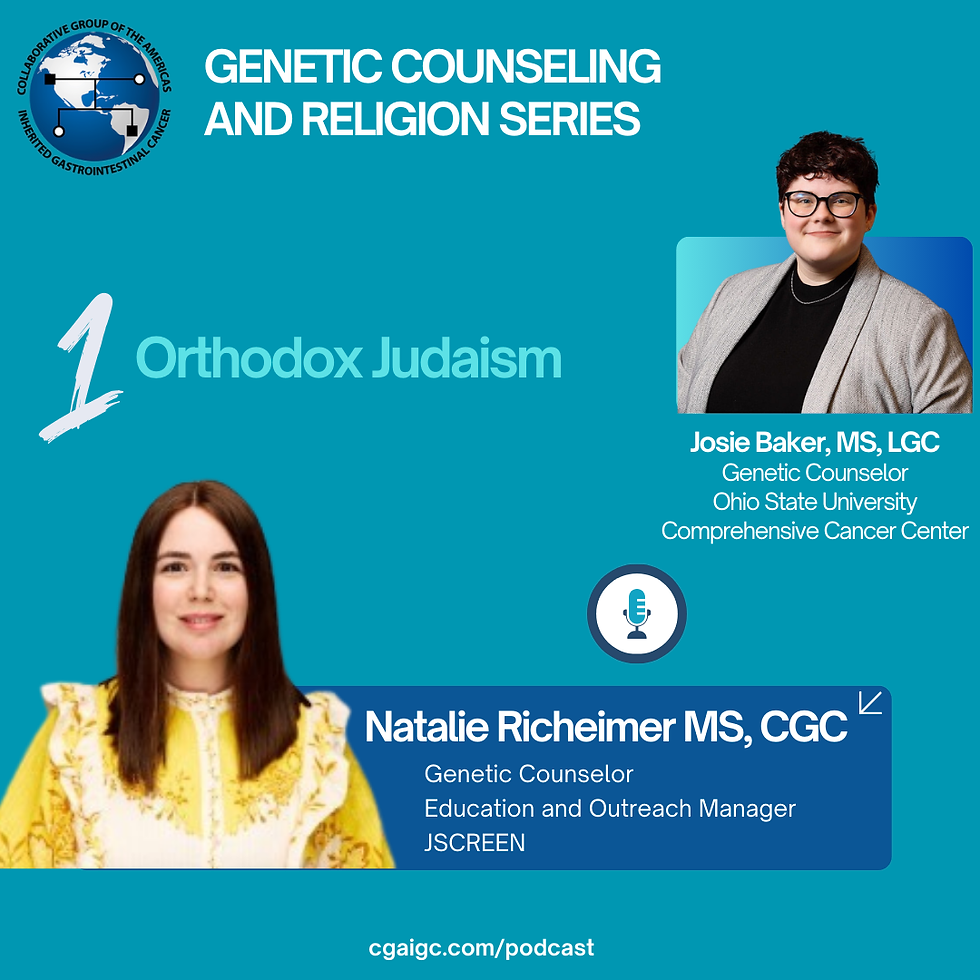Germline Variants in Appendiceal Cancer: What’s the Deal?
- CGA-IGC
- Aug 20, 2024
- 3 min read

The frequency of pathogenic germline variants in individuals with appendiceal cancer has largely been unknown. While studies suggest a low prevalence of microsatellite instability in this cancer, it has been unclear what percentage of appendiceal cancers are related to a hereditary cancer predisposition.
Image courtesy of everydayhealth.com
In January 2023, Holowatyj et al. published a study in JAMA Oncology that assessed the frequency of pathogenic germline alterations in a cohort of 131 patients with appendiceal cancer. They found that 10.8-11.5% of tested individuals carried an inherited cancer gene sequence variation, suggesting that germline genetic testing should be a consideration in this population.
In July 2023, Foote et al. published a study looking at germline pathogenic variants in individuals with appendiceal adenocarcinomas, trying to assess if these variants are drivers of appendiceal cancer or simply reflect incidental findings. Dr. Michael Foote et al., evaluated 237 patients with pathologist-confirmed appendiceal adenocarcinoma and defined the cooccurrence of LP/P germline variants and second-hit pathogenic somatic alterations, as well as the associations between germline variants and patient clinicopathologic features.

Results:
Twenty-five of 237 patients (10.5%) carried pathogenic or likely pathogenic germline variants in cancer susceptibility genes.
Clinicopathologic characteristics and appendiceal adenocarcinoma–specific survival were similar in patients with or without germline variants.
Most (92%, N = 23/25) patients with germline variants demonstrated no second-hit somatic alterations, including loss of heterozygosity.
Two patients with a germline APC I1307K low-penetrance founder variant exhibited secondary somatic pathogenic alterations in APC. However, only one patient tumor exhibited APC-mediated WNT signaling dysregulation: a plausible consequence of multiple somatic APC mutations with no germline variant contribution.
Four patients had germline variants in PMS2 or MSH2 associated with Lynch syndrome, yet their cancers were microsatellite-stable.
We spoke with Dr. Foote, who summarized the team’s key takeaways from this study:
“Although pathogenic or likely pathogenic germline variants were found in 10.5% out of 237 patients with appendiceal adenocarcinoma, nearly all of these positive germline variants were likely incidental and did not contribute to inactivation of tumor-related genes in the appendix cancer. This conclusion is supported by the fact that in every case, there was either a functional remaining normal copy of the gene in the tumor and/or functional normal protein found in the patient tumor.”
Dr. Foote et al., reported a similar rate of germline variants to the previous observational study by Holowatyj et al. However, with the integration of germline and somatic molecular analysis, this study suggests that germline variants, despite being prevalent, may be incidental.
Limitations:
Testing referral bias.
Epigenetic silencing was not evaluated.
Disease-specific survival analyses lacked sufficient power to detect a small effect size.
Laboratory investigation is necessary to definitively examine causality between all germline variants and tumorigenesis.
Dr. Foote provided us with his views on how these findings may be integrated into clinical practice:
“Our data should reassure patients that appendiceal cancer is not clearly related to heritable variants. Just because a patient has a germline variant does not mean that their family is at high risk of an appendiceal tumor; standard of care recommendations for cancer screening should be employed, but the data does not support additional screening for appendix cancer. Even more broadly, our data suggests the valuable distinction that the presence of germline variants does not necessarily mean that they are involved in the tumor; correlation does not mean causation.”
Michael B. Foote, Henry Walch, Yelena Kemel, Efsevia Vakiani, Paul Johannet, Margaret Sheehan, Walid Chatila, Sebastian Chung, Garrett M. Nash, Anna Maio, Jinru Shia, Diana Mandelker, Michael Berger, Nikolaus Schultz, Luis A. Diaz, Andrea Cercek, Zsofia K. Stadler. The Impact of Germline Alterations in Appendiceal Adenocarcinoma. Clin Cancer Res 15 July 2023; 29 (14): 2631–2637.
Holowatyj AN, Washington MK, Tavtigian SV, Eng C, HortonC
.Inherited Cancer Susceptibility Gene Sequence Variations Among Patients With Appendix Cancer. JAMA Oncol. 2022 Nov 11;9(1):95-101





Comments